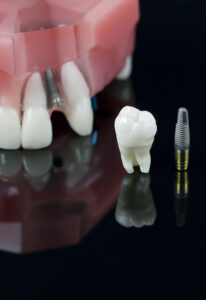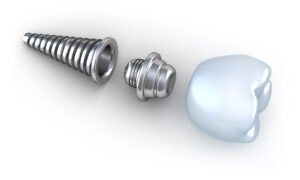Dental implants are a fantastic solution for replacing missing teeth, providing a stable and long-lasting alternative to dentures and bridges. As an oral surgeon, I’ve seen firsthand how dental implants can transform lives by restoring smiles and improving oral health. However, the success of dental implants doesn’t end with the surgery. Proper care is essential to ensure their longevity and maintain overall oral health. This blog aims to provide Briarcliffe patients with practical tips for taking care of their dental implants, ensuring they remain in excellent condition for years to come.
Tips for Dental Implant Care
Dental implants consist of a titanium post surgically placed into the jawbone, acting as a root for a replacement tooth. This post fuses with the jawbone through a process called osseointegration, providing a stable foundation for a crown, bridge, or denture. Unlike other tooth replacement options, implants do not affect adjacent teeth and offer superior durability and functionality.
The benefits of dental implants are numerous. They help maintain the jawbone’s integrity, prevent the shifting of neighboring teeth, and provide a natural-looking and feeling tooth replacement. However, the success of implants relies heavily on diligent oral hygiene and regular dental care. Understanding the structure and benefits of implants underscores the importance of proper maintenance.
Here are tips for dental implant care that Briarcliffe patients can benefit from:
1. Establish a Daily Oral Hygiene Routine
Caring for dental implants starts with a consistent and thorough oral hygiene routine. Here’s a detailed guide to ensure your implants stay clean and healthy:
BRUSHING
Use a soft-bristled toothbrush and non-abrasive toothpaste to brush your teeth at least twice a day. Pay special attention to the implant area, gently brushing all surfaces of the implant crown and surrounding gum tissue. Electric toothbrushes can also be effective in maintaining oral hygiene.
FLOSSING
Flossing is crucial to remove plaque and food particles from between the teeth and around the implants. Use dental floss designed for implants or interdental brushes to clean hard-to-reach areas. Make sure to floss daily, taking care to avoid damaging the gum tissue.
INTERDENTAL BRUSHES
These small interdental brushes are perfect for cleaning around the implant posts and other tight spaces. Use them in conjunction with regular flossing to ensure thorough cleaning.
MOUTHWASH
An antimicrobial mouthwash can help reduce bacteria in the mouth, protecting your gums and implants from infection. Rinse with mouthwash as recommended by your dentist to maintain a healthy oral environment.
2. Schedule Regular Dental Check-ups
Routine dental visits play a vital role in the maintenance of dental implants. These check-ups allow your dentist to monitor the health of your implants and surrounding tissues, ensuring any potential issues are addressed promptly.
During a dental implant check-up, your dentist will:
- Examine the implant site for signs of inflammation, infection, or other issues.
- Assess the stability of the implant and the condition of the surrounding bone.
- Clean the implant and adjacent teeth to remove plaque and tartar buildup.
- Provide personalized advice on maintaining optimal oral health.
It’s recommended to visit your dentist every six months for a thorough examination and cleaning. However, your dentist may suggest a different frequency based on your specific needs and oral health condition. Regular check-ups are essential for early detection and prevention of potential problems, ensuring the longevity and success of your dental implants.
3. Follow Diet and Lifestyle Considerations
Proper care for your dental implants extends beyond daily oral hygiene and regular dental check-ups. Your diet and lifestyle choices also play a significant role in maintaining the health and longevity of your implants. Here are some important considerations:
Foods and Beverages to Avoid:
- Hard and Crunchy Foods: Foods like hard candies, ice, and nuts can put excessive pressure on your dental implants, potentially causing damage. It’s best to avoid these items to prevent any undue stress on your implants.
- Sticky and Chewy Foods: Caramel, taffy, and other sticky foods can cling to your implants and natural teeth, making it difficult to clean them thoroughly. These foods can also pull on your implants, which is not ideal.
- Sugary and Acidic Foods and Drinks: Excessive consumption of sugary foods and drinks can lead to plaque buildup, which can harm your gums and the surrounding bone. Acidic foods and beverages, like citrus fruits and soda, can erode the enamel on your natural teeth and affect the implant area.
Healthy Dietary Habits:
- Balanced Diet: A diet rich in fruits, vegetables, lean proteins, and whole grains supports overall oral health. These foods provide essential nutrients that promote healthy gums and bone structure, which are crucial for the stability of dental implants.
- Calcium and Vitamin D: Foods high in calcium and vitamin D, such as dairy products, leafy greens, and fortified foods, help maintain strong bones and teeth. Consider including these in your diet to support your implants.
- Hydration: Drinking plenty of water helps wash away food particles and bacteria, maintaining a clean oral environment. Water also neutralizes acids in the mouth, protecting your teeth and implants from decay and erosion.
Lifestyle Choices:
- Quit Smoking: Smoking can severely impact the health of your dental implants. It hinders the healing process after implant surgery and increases the risk of implant failure. If you smoke, consider quitting to improve the success rate of your dental implants and overall oral health.
- Limit Alcohol Consumption: Excessive alcohol consumption can negatively affect oral health by reducing saliva production and contributing to gum disease. Moderation is key to maintaining a healthy mouth.
4. Address Complications Promptly
Even with meticulous care, complications can sometimes arise with dental implants. Recognizing and addressing these issues promptly is crucial for maintaining the health of your implants and preventing further problems. Here’s what you need to know:
Common Issues with Dental Implants:
- Infection: Infections around the implant site, known as peri-implantitis, can occur if bacteria build up. Symptoms include redness, swelling, and bleeding around the implant. If left untreated, infection can lead to bone loss and implant failure.
- Discomfort or Pain: Some discomfort is normal immediately after the implant procedure, but persistent or severe pain is not. It could indicate an issue with the implant’s placement or infection.
- Implant Loosening: Dental implants are designed to be stable and secure. If an implant feels loose, it could be due to inadequate osseointegration (the fusion of the implant with the jawbone) or bone loss around the implant.
Signs of Complications:
- Redness and Swelling: Persistent redness and swelling around the implant site can indicate an infection.
- Bleeding: Bleeding when brushing or flossing around the implant can be a sign of gum inflammation or peri-implantitis.
- Pain or Discomfort: Ongoing pain, especially when chewing, can signal an underlying issue.
- Loose Implant: Any movement or looseness in the implant should be addressed immediately.
Steps to Take if Complications Occur:
- Contact Your Dentist: If you notice any signs of complications, schedule an appointment with your dentist as soon as possible. Early intervention can prevent more serious problems.
- Follow Professional Advice: Your dentist may recommend specific treatments, such as a deep cleaning around the implant, antibiotics for infection, or other procedures to address the issue. Follow their advice carefully.
- Maintain Good Oral Hygiene: Continue to practice excellent oral hygiene to prevent further complications. Brush and floss gently around the affected area to keep it clean.
- Avoid Aggravating Activities: Refrain from activities that may exacerbate the issue, such as chewing hard foods or smoking, until the problem is resolved.
5. Commit to Long-term Care and Maintenance
The success of your dental implants depends significantly on long-term care and maintenance. Even after the initial recovery and adjustment period, continuous efforts are necessary to ensure that your implants remain in optimal condition. Here’s how you can commit to their long-term care:
Consistent Oral Hygiene
Maintaining a daily oral hygiene routine is crucial. Brush your teeth at least twice a day and floss daily to remove plaque and food particles. Use an antimicrobial mouthwash to reduce bacteria in your mouth.
Use Proper Tools
Choose a soft-bristled toothbrush and non-abrasive toothpaste to avoid damaging your implants and surrounding gum tissue. Interdental brushes and water flossers can help clean hard-to-reach areas around the implants.
Regular Professional Cleanings
Schedule regular professional cleanings with your dentist or dental hygienist. These cleanings help remove plaque and tartar buildup that regular brushing and flossing might miss, keeping your gums and implants healthy.
Importance of Continuous Adherence:
- Preventing Gum Disease: Consistent care helps prevent gum disease, which can compromise the health of your implants. Healthy gums are essential for the stability and longevity of dental implants.
- Monitoring Bone Health: Regular check-ups and cleanings allow your dentist to monitor the health of the bone around your implants. This ensures that any signs of bone loss are detected and addressed early.
- Avoiding Complications: Adhering to a long-term care plan reduces the risk of complications such as peri-implantitis, which can lead to implant failure if not managed properly.
Tips for Ensuring Longevity:
- Stay Hydrated: Drinking plenty of water helps keep your mouth clean and reduces the risk of plaque buildup.
- Healthy Diet: A balanced diet rich in essential nutrients supports oral health. Foods high in calcium and vitamin D are particularly beneficial for maintaining strong bones and teeth.
- Avoid Harmful Habits: Refrain from smoking and limit alcohol consumption, as these can negatively impact the health of your gums and implants.
- Protect Your Implants: If you engage in activities that pose a risk of impact to your mouth, such as contact sports, wear a mouthguard to protect your implants from damage.
Trust Dr. Greenberg for Your Dental Implant Needs
When it comes to dental implant installation and care, you deserve the expertise and compassion of a seasoned professional. Dr. Andrew Greenberg, an esteemed oral surgeon in Westchester County, NY, offers exceptional care in dental implants, teeth extraction, and a range of other oral surgery procedures.
With years of experience, Dr. Greenberg has helped countless patients restore their smiles and oral health. Whether you need a dental implant, tooth extraction, or bone grafting, you can trust Dr. Greenberg to provide personalized and effective treatment. His commitment to patient care extends beyond the office, as demonstrated by his humanitarian dental missions to Jamaica, where he provides vital oral surgery to those in need.
Don’t wait to take the next step in achieving optimal oral health. Book an appointment and visit our office in Briarcliff Manor today to experience the exceptional care that Dr. Greenberg offers.


